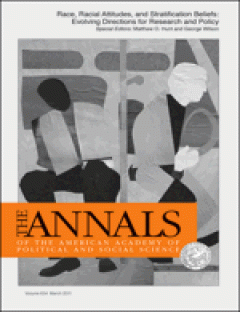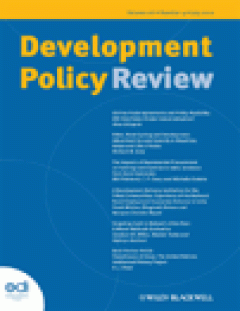Filter by

Racial Discrimination, Interpretation, and Legitimation at Work
Research on race stratification and employment usually implies discrimination as a key mechanism in race stratification, although few if any analyses bring attitudes, employee-employer interpretations, and established discriminatory behavior into a singular analysis. In this article, the authors do so and offer a relational account of how discrimination operates, drawing on a large sample of ve…
- Edition
- Vol. 634 no. 1, March 2011.pp. 39-59
- ISBN/ISSN
- 00027162
- Collation
- -
- Series Title
- The ANNALS of the American Academy of Political and Social Science
- Call Number
- -

Race, Religion, and Beliefs about Racial Inequality
This article focuses on stratification beliefs and racial policy opinions among white and black Americans who differ in religious preference. First, it summarizes earlier research on white conservative Protestants and outlines characterizations of Black Protestant church congregants. It then reports patterns of stratification beliefs and racial policy opinions among blacks and whites varying in…
- Edition
- Vol. 634 no. 1, March 2011 .pp. 60-77
- ISBN/ISSN
- 00027162
- Collation
- -
- Series Title
- The ANNALS of the American Academy of Political and Social Science
- Call Number
- -

Including Oneself and Including Others : Who Belongs in My Country?
To be a full member of a country, must one have citizenship, the same ethnic or racial background, or the same religion as most citizens? What do people of different statuses believe about the criteria for inclusion? To answer these questions, the authors analyze the 2003 International Social Survey Programme survey on national identity, focusing on ten wealthy, democratic countries. They find …
- Edition
- Vol. 634 no. 1, March 2011.pp. 78-97
- ISBN/ISSN
- -
- Collation
- -
- Series Title
- The ANNALS of the American Academy of Political and Social Science
- Call Number
- -

On the Meaning, Measurement, and Implications of Racial Resentment
A new racism, it is claimed, has become a dominant feature of contemporary American politics. According to the theory�s originators, the new racism has largely replaced the old racism, which was based on the alleged biological inferiority of blacks. The new racism, referred to as �symbolic racism� or, more recently, �racial resentment,� by contrast, is defined as a conjunction of anti-black fee…
- Edition
- Vol. 634 no. 1, March 2011.pp. 98-116
- ISBN/ISSN
- 00027162
- Collation
- -
- Series Title
- The ANNALS of the American Academy of Political and Social Science
- Call Number
- -

Reexamining Racial Resentment : Conceptualization and Content
There is an ongoing debate in the racial attitudes literature about the degree to which new racism measures actually tap negative racial beliefs. Racial resentment is one construct that has been criticized on such grounds. To date, Kinder and Sanders (1996) have proposed the most commonly utilized measure of racial resentment, which is largely based on a similar construct�symbolic racism. The a…
- Edition
- Vol. 634 no. 1, March 2011.pp. 117-133
- ISBN/ISSN
- 00027162
- Collation
- -
- Series Title
- The ANNALS of the American Academy of Political and Social Science
- Call Number
- -

Whites’ Racial Policy Attitudes in the Twenty-First Century : The Continuin…
A topic of long-standing interest in racial attitudes research is whites� support for principles of racial equality on one hand coupled with their intransigence on policies designed to redress that inequality on the other. Much has been written on possible explanations of this �principle-policy gap� and what the gap reveals about the state of contemporary American race relations. In this articl…
- Edition
- Vol. 634 no. 1, March 2011.pp. 134-152
- ISBN/ISSN
- 00027162
- Collation
- -
- Series Title
- The ANNALS of the American Academy of Political and Social Science
- Call Number
- -

Racial Attitudes in City, Neighborhood, and Situational Contexts
Multiple social contexts have been shown to affect racial attitudes both positively and negatively when considered at different levels. In this article, context is simultaneously considered at three different levels: the metropolitan area, the census block group, and the interview situation (as measured by race of interviewer/race of respondent matching). Significant effects can be classified i…
- Edition
- Vol. 634 no. 1, March 2011.pp. 153-173
- ISBN/ISSN
- 00027162
- Collation
- -
- Series Title
- The ANNALS of the American Academy of Political and Social Science
- Call Number
- -

“Color Coding” and Support for Social Policy Spending : Assessing the Par…
This study uses data from the 1996 through 2002 General Social Survey to examine whether one variant of modern racial prejudice��color coding��explains support for several ostensibly nonracial government spending policies regarding crime, urban problems, and drug addiction (welfare and race spending are used as baseline measures). Findings indicate that color coding does not extend appreciably …
- Edition
- Vol. 634 no. 1, March 2011.pp. 174-189
- ISBN/ISSN
- 00027162
- Collation
- -
- Series Title
- The ANNALS of the American Academy of Political and Social Science
- Call Number
- -

The Sweet Enchantment of Color-Blind Racism in Obamerica
It has become accepted dogma among whites in the United States that race is no longer a central factor determining the life chances of Americans. In this article, the authors counter this myth by describing how the ideology of color-blind racism works to defend and justify the contemporary racial order. The authors illustrate three basic frames of this ideology, namely, abstract liberalism, cul…
- Edition
- Vol. 634 no. 1. March 2011.pp. 190-206
- ISBN/ISSN
- 00027162
- Collation
- -
- Series Title
- The ANNALS of the American Academy of Political and Social Science
- Call Number
- -

The “Obama Effect” and White Racial Attitudes
To what extent did the presidential candidacy and election of Barack Obama affect whites� more general perceptions of African Americans? Responses to survey questions in which respondents were asked to place blacks on scales running from �stupid� to �intelligent� and from �lazy� to �hardworking� revealed that whites� views of blacks� intelligence and work ethic have become somewhat more positiv…
- Edition
- Vol. 634 no. 1, March 2011.pp. 207-220
- ISBN/ISSN
- 00027162
- Collation
- -
- Series Title
- The ANNALS of the American Academy of Political and Social Science
- Call Number
- -

DPR Debate : Growth Identification and Facilitation: The Role of the State in…
This DPR Debate is based on the contribution by Justin Lin, Chief Economist at the World Bank, and his colleague C�lestin Monga, on �Growth Identification and Facilitation: The Role of the State in the Dynamics of Structural Change�. The article under consideration is important and timely as it articulates a number of new policy implications from Justin Lin's earlier work on New Structural Econ…
- Edition
- Volume 29, Issue 3, May 2011, pages 259–310
- ISBN/ISSN
- 09506764
- Collation
- -
- Series Title
- Development Policy Review
- Call Number
- -

Poverty Research in a Development Policy Context
This article provides an evaluation of the extent to which science is addressing worldwide poverty and hunger. It is based on the literature contained in the Thomson Reuters' Web of Science Citation Index (1980 to 2008) and focuses on the WOTRO Strategy Plan 2007�2010 of the Netherlands Foundation for the Advancement of Tropical Research, although similar policies from other countries might als…
- Edition
- Volume 29, Issue 3, May 2011, pages 311–330
- ISBN/ISSN
- 09506764
- Collation
- -
- Series Title
- Development Policy Review
- Call Number
- -

Whither Commodity-based Trade?
Market access for livestock products from Africa has traditionally been limited by the presence of certain infectious diseases that pose risks to animal and human health. However, an increasingly discussed option for widening that access is commodity-based trade (CBT) focusing on the health and safety attributes of the product rather than the disease status of the country of origin. There have,…
- Edition
- Volume 29, Issue 3, May 2011, pages 331–357
- ISBN/ISSN
- 09506764
- Collation
- -
- Series Title
- Development Policy Review
- Call Number
- -

Pathways of Technological Change in Developing Countries: Review and New Agenda
This article argues the need for strategic reorientation with regard to the technological advancement of developing countries. The continued relevance of incremental capability-building strategies in manufacturing is questioned by: (i) the emergence of new knowledge areas, some of which require closer links with science; (ii) recognition that past strategies have not solved the poverty problem;…
- Edition
- Volume 29, Issue 3, May 2011, pages 359–380
- ISBN/ISSN
- 09506764
- Collation
- -
- Series Title
- Development Policy Review
- Call Number
- -

A model of intellectual capital management capability in the dynamic business…
This paper discusses the way in which intellectual capital (IC) can be managed to assist organization to overcome dynamic challenges. An intellectual capital management capability (ICMC) model is developed which permits the management of an organization to realize the potential of IC by measuring the maturity level of its IC. The model is consistent with dynamic capability theory, which suggest…
- Edition
- Vol. 8, Number 1, March 2010.pp. 15–23
- ISBN/ISSN
- 14778238
- Collation
- -
- Series Title
- Knowledge Management Research & Practice
- Call Number
- -

Linking social capital to organizational growth
In the current discussion of the intellectual capital, three main themes have been brought up: intangible assets, the dynamic capabilities to create and modify these assets, and the social relationships in which the knowledge processes take place, that is social capital. Within the latter view, knowledge is understood as a socially constructed and shared resource, and the focus is on the charac…
- Edition
- Vol. 8, Number 1, March 2010.pp. 4–14
- ISBN/ISSN
- 14778238
- Collation
- -
- Series Title
- Knowledge Management Research & Practice
- Call Number
- -

TaxoFolk : a hybrid taxonomy–folksonomy classification for enhanced knowled…
Taxonomy is widely used in many of the website and directory navigation schemes for content/knowledge retrieval. However, information or content navigation support through taxonomy is often constrained due to its inability to take into account the full nomenclature and cultural nuances of knowledge seekers. The emergence and increasing adoption of collaborative tagging (social bookmarking) tool…
- Edition
- Vol. 8, No. 1, March 2010.pp. 24–32
- ISBN/ISSN
- 14778238
- Collation
- -
- Series Title
- Knowledge Management Research & Practice
- Call Number
- -

The interplay between individual and collective knowledge : technologies for …
This article presents a framework model that defines knowledge building as a co-evolution of cognitive and social systems. Our model brings together Nonaka's knowledge-creating theory and Luhmann's systems theory. It is demonstrated how collaborative knowledge building may occur � in an ideal situation � within an organisation, when people interact with each other using shared digital artefacts…
- Edition
- Vol. 8 No. 1, March 2010.pp. 33–44
- ISBN/ISSN
- 14778238
- Collation
- -
- Series Title
- Knowledge Management Research & Practice
- Call Number
- -

Software and human agents in Knowledge Codification
In the age of digital networks and databases, gathering data is no longer a differentiating attribute. Instead, the onus is upon creating knowledge and codifying it into the organizational routine. The central theme of this paper is to offer a systematic knowledge codification routine that embodies specific agent attributes and best re-engineering practices. The knowledge process re-engineering…
- Edition
- Vol. 8, No. 1, March 2010.pp. 45–60
- ISBN/ISSN
- 14778238
- Collation
- -
- Series Title
- Knowledge Management Research & Practice
- Call Number
- -

The Inventor game : game-theoretical analysis of knowledge-sharing between in…
Knowledge-sharing has often been analysed by one-shot game models, where the balance between costs and the value of knowledge exchanges for different exchange partners has been calculated. This paper reviews this literature and discusses five of its assumptions: (1) the assumption of homogeneity of knowledge, (2) the assumption of one-shot solutions, (3) the assumption of knowledge as value, (4…
- Edition
- Vol. 8, No. 1, March 2010.pp. 61–75
- ISBN/ISSN
- 14778238
- Collation
- -
- Series Title
- Knowledge Management Research & Practice
- Call Number
- -
 Computer Science, Information & General Works
Computer Science, Information & General Works  Philosophy & Psychology
Philosophy & Psychology  Religion
Religion  Social Sciences
Social Sciences  Language
Language  Pure Science
Pure Science  Applied Sciences
Applied Sciences  Art & Recreation
Art & Recreation  Literature
Literature  History & Geography
History & Geography